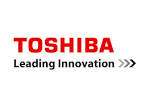1 min read
TOSHIBA ANNOUNCES NEW MN07 SERIES HARD DRIVES FOR NAS PLATFORM OEMS AND INTEGRATORS

March 28, 2025
Copyright 2023, IT Voice Media Pvt. Ltd.
All Rights Reserved

 Toshiba Electronic Components Taiwan Corporation (“Toshiba”), a committed technology leader, announced the MN07 Series 12TB and 14TB 3.5-inch hard disk drives for use in NAS platforms. The Toshiba MN07 Series utilizes a helium-sealed mechanical design to achieve the massive 14TB and 12TB capacity. The 14TB model improves power efficiency by approximately 55 percent (W/GB[3]) over the previous 10TB “air” 7,200rpm mechanical designs.
Toshiba Electronic Components Taiwan Corporation (“Toshiba”), a committed technology leader, announced the MN07 Series 12TB and 14TB 3.5-inch hard disk drives for use in NAS platforms. The Toshiba MN07 Series utilizes a helium-sealed mechanical design to achieve the massive 14TB and 12TB capacity. The 14TB model improves power efficiency by approximately 55 percent (W/GB[3]) over the previous 10TB “air” 7,200rpm mechanical designs.